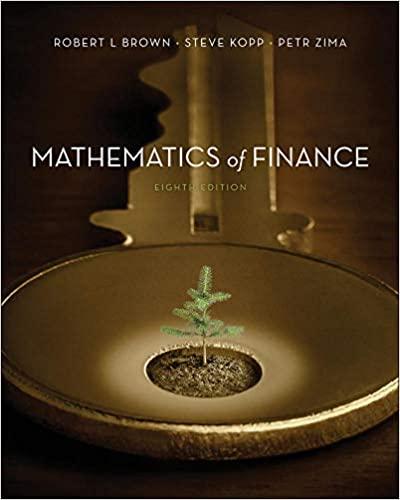Question
As a recently qualified financial advisor, you are helping a client who is a bright scholarship student who just graduated from university invest her 1,000,000
As a recently qualified financial advisor, you are helping a client who is a bright scholarship student who just graduated from university invest her 1,000,000 inheritance from an estranged relative. You plan to divide the clients capital into 2 parts or tranches. The first part or tranche consists only of government bonds, the second part or tranche only individual stocks. Before committing the fund, you decide to backtest (i.e. see how the portfolio would have performed in a previous time period) and present the portfolio report to the client. Required: Decide what percentage of the portfolio you will allocate to bonds and what percentage to stocks. Explain clearly why you made these choices given the clients specific characteristics based on the information provided about her. State any assumptions you make clearly.
In the first part of the portfolio, choose a minimum of three government bonds issued by any government which you could utilise data from Bloomberg on. Justify why these are the best choices based on your analysis of these bonds and the issuing government.
In the second part of the portfolio, choose minimum of 3 stocks. You can consider equity stocks in any financial market, and choose any market available in Bloomberg, but you are limited to trade only equity stocks (no ETFs nor index funds) on major exchanges. You need to explain to the client choices of each stock. To convince her that these stocks are good financial bet, your analysis and discussion should include aspects such as: choice of a particular market; its overview and major characteristics; stocks valuation expectation of the stocks future performance; the criteria used to select stocks; capital allocation of each stock; reasons of allocation etc. Bloomberg equity screening function (EQS) can help with this task.
Your portfolio hypothetical start date for all parts is 5th September 2023. Calculate the return and risk for each part of the portfolio separately from 5th September to 5th November 2023, to backtest its hypothetical performance. Compare the return and risk of each tranche to a chosen benchmark with similar characteristics. Calculate the total return of the entire portfolio. How did the portfolio perform compared to simply putting her money at the bank at prevailing interest rates?
How does it compare to another chosen benchmark? Explain in detail why the portfolio performs better (or worse) than the benchmark. Bloomberg portfolio management function (PORT) can help with this task. Also please discuss which tranche performs better during the back testing period and why? As a quality assurance, present a scenario analysis to the client. Hypothetical analysis of the portfolio if a crisis (in scale similar to COVID-19 or the 2008 crisis) strikes. Is your portfolio crisis proof? Why? If not, how can you reduce exposure to a financial crisis. Analysis does not need to be quantitative, discursive discussion is fine.
Step by Step Solution
There are 3 Steps involved in it
Step: 1

Get Instant Access to Expert-Tailored Solutions
See step-by-step solutions with expert insights and AI powered tools for academic success
Step: 2

Step: 3

Ace Your Homework with AI
Get the answers you need in no time with our AI-driven, step-by-step assistance
Get Started


